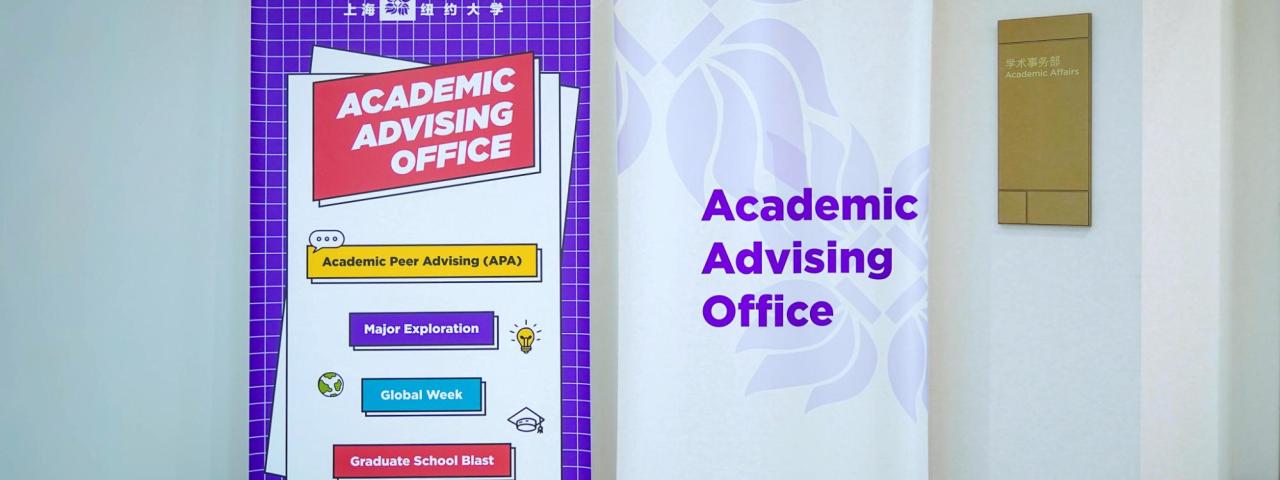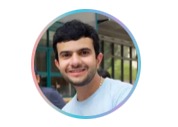
Choosing a major is one of the most significant decisions a college student will face.
NYU Shanghai, China’s first Sino-US research university and the third degree-granting campus of NYU’s global network, aims to cultivate globally-minded graduates through innovative teaching, world-class research, and a commitment to public service. Undergraduates begin their academic careers with core courses and then select an academic specialization for deeper study and research while continuing to take electives outside of that area. While this flexibility offers numerous possibilities, it also introduces a new challenge: finding the most suitable academic path forward.
Academic advisors play an essential role in guiding students as they choose their major, customize their course schedules, and develop personalized academic plans. Advisors help students enhance themselves and develop into members of an academic and professional community.
Every undergraduate student at NYU Shanghai is paired with an academic advisor based on their academic interests. Students receive personalized, one-on-one advising and academic support. Academic advisors come from top institutions and leverage their extensive professional advising knowledge to help students make academic decisions—from choosing what majors to explore to navigating resources toward their educational and professional goals.
Three NYU Shanghai students and the academic advising team shared their experiences working together.
Yang Shanglin ’24
Major: Neural Science and Data Science
Currently Pursuing a PhD in Cognitive Science at the UC Irvine

At NYU Shanghai, first-year students can take Foundations of Science (FoS) courses. From day one, I knew I wanted to major in science and engineering but struggled to choose between Biology and Neural Science. They are closely related, with the latter often considered a subfield of the former, making it difficult to decide which path to pursue.
My academic advisor recommended that I take Introduction to Neural Science, which was also an elective for Biology. After completing the course, I found that the mindset related to Neural Science resonated with me more, so I declared it as my major during my sophomore year.
I was considering a double major in Data Science because of its growing importance in Neural Science experiments and the broader need for computational skills in science and engineering. However, with very few overlapping classes between the two fields, I needed to assess whether it would be feasible to graduate successfully while pursuing both majors.
I worked with my academic advisor to calculate the credits, review the course schedule, email Area Heads for evaluation, and ultimately revise my Four-Year Plan.
Choosing a double major without proper planning can jeopardize graduation. For example, strict restrictions on class sizes might prevent you from enrolling in a course, or a class could be suddenly canceled. Such situations require careful planning and alternative strategies. My academic advisor, with their deep understanding of the University’s policies, was crucial in helping me design a detailed plan to navigate these challenges.
During my junior year, while studying away in New York, I took several Data Science classes and enrolled in summer courses to manage my time effectively. Given the time constraints, my academic advisor suggested I utilize the special double counting rule between Data Science and Neural Science majors. Additionally, with their help, I submitted global course evaluations for the New York courses to count toward NYU Shanghai’s degree requirements. By the end of my final semester, I was able to complete the coursework requirements for my double major.
Working with my academic advisor has been truly rewarding. For tasks like the Four-Year Plan and petitions, I managed the actual work based on their guidance. My academic advisor handled the final application to the academic program and got back to me once everything was confirmed. This collaboration was both a part of her daily work and a testament to our joint effort. Every time I received the results, I felt a great sense of happiness, and I could tell that my academic advisor shared in that joy as well.
Academic advisors support students in planning their academic paths
We are a team of 15 academic advisors supporting student’s academic exploration via 1-1 interactions as part of the developmental process. We discuss topics like course selection, major exploration, study away, and four-year academic planning.
First-year and sophomore students are required to meet with their academic advisor before registration to discuss academic plans and get their registration “hold” released for the next semester. Regardless of their major declaration status, students are highly recommended to meet with us for ongoing conversations. Our goal is to establish a partnership from the start, ensuring that each conversation begins with equity and respect.
Whenever students plan to declare a major, pursue a secondary major, add a minor, or switch majors, we help them navigate their paths, ensuring they understand coursework requirements and reflect on their own expectations and capabilities. We encourage students to follow their passions while taking various (e.g. financial, professional, family, etc) aspects into the decision-making process. Independence in decision-making means students should not rely on unconscious acceptance of others’ suggestions or peer pressure; they need to think critically for themselves.
We facilitate students’ exploration based on their academic interests. For example, if a student is inspired by a documentary and wants to explore changes in human society, we might introduce them to the anthropology track of Social Science, while also explaining other branches within this field. If a student is undecided about their major, we would advise them to explore introductory-level courses in a variety of areas and recommend they speak with professors or Area Heads for further guidance.
Such exchanges help overcome stereotypes towards certain majors. For example, a Computer Science major student struggled with his major introductory-level courses, but excelled in Humanities and Social Science related courses. His academic advisor encouraged him to talk with professors from both fields to explore his interests and potential directions. Ultimately, he decided to switch his major from Computer Science to Social Science and continued to pursue related research opportunities in this field after graduation.
As academic advisors, we monitor students’ academic performance, identify potential at-risk students through Academic Alert, and connect them with relevant academic resources through the Academic Support Program (ASP). If a student finds their major program more challenging than expected, we will communicate with them to adjust their academic path based on their interests, areas of expertise, and goals.
Sunny Xu Xiaoqing ’26
Major: Social Science (Anthropology)

When I arrived at NYU Shanghai, I indicated that I intended to focus on Humanities or Social Science for my major, with the possibility of pursuing a double major.
I had an overview of both areas but needed to explore further as I wasn’t certain which track interested me most. In the fall, I took a Philosophy class within Humanities, and in the spring, I enrolled in a Social Science course. Additionally, I took a class in Interactive Media Arts (IMA) when fulfilling a core curriculum requirement.
My academic advisor believed that in-person class experiences were crucial for selecting a course. Following our discussion during my spring semester of first year, I enrolled in Human Society and Culture, an introductory Anthropology course to further explore the discipline. The course was taught by a GPS Fellow, an anthropologist who had previously guided me in a recitation of the core course Global Perspectives of Society (GPS). His insights sparked my interest in Anthropology, and I became deeply intrigued by the field through our interactions and my own research.
At that time, I served as an Academic Peer Advisor (APA), Orientation Ambassador (OA), and Admission Ambassador (AA) at NYU Shanghai. To fulfill these roles, I received professional training and gained a comprehensive understanding of the various departments at the University. Given its unique course selection system, I frequently encountered questions from prospective students and parents about major exploration, course selection, and career prospects. To provide more accurate answers, I took the initiative to use academic resources and enhance my understanding through practical experience.
In addition, I participated in various events organized by the Community Engaged Learning (CEL) program and the Global Awards Office at the University. These experiences deepened my interest in the Anthropology track within Social Science. I also found the Philosophy track within Humanities intriguing and considered that pursuing it as a double major could be a valuable option. However, after discussing it with my academic advisor, I realized that focusing on these two majors would leave little time for exploring other fields and courses. Therefore, I decided to declare just one major to allow myself more flexibility to study and try different subjects.
The communication between us has always been smooth. I make it a habit to sift through all the information I can find first. If I still have questions, I turn to my academic advisor as a supplemental resource. By doing some groundwork and asking focused questions, I find that our advising sessions are much more productive.
Academic Advisors teach students to find their own answers.
NYU Shanghai features a unique curriculum design with core courses of liberal arts education and specialized tracks within some majors. For example, Social Science alone has nine different tracks. It can be challenging for first-year students to fully understand, so seeking help from an academic advisor or consulting with seniors is a valuable approach.
Some new students might ask us directly if a major program is right for them. However, they need to make the decision themselves and take responsibility for their choices. This process is a crucial aspect of their personal development.
We established the APA program to select students from various majors who excel academically and are also capable of engaging in additional student services. This diversity allows new students to see different academic journeys, understand the challenges faced by upperclass students and learn how they made their choices. They’ll come to realize that there’s no single “right” path but only the one that fits them best, and that setbacks are simply part of the process.
Our support isn’t about providing solutions directly. Whether it’s an academic advisor assisting a student or an APA guiding a peer, the goal is to teach them how to find their own answers. The true value lies in empowering students to utilize these resources and develop their own solutions.
APAs receive a variety of training from the advising team that enables them to practice empathy, and provide peer insights from their own experiences.We hope that through this program, APAs will develop new skills and become well-rounded individuals. We’ve written recommendation letters for APAs, including one who was accepted into Harvard University’s Master’s Program in Education. Seeing them thrive and succeed genuinely brings us joy.
Samvel Davtyan ’25
Major: Business and Marketing
Minor: Social Science (International Relations)
Hometown: Armenia

I think it’s a bit harsh to expect students to “stick with one program” because people’s interests are diverse and ever-changing.
Before enrolling at NYU Shanghai, I studied at Lycée Professionnel Français en Arménie, where I discovered my passion for marketing. Consequently, upon arriving at NYU Shanghai, I chose to major in Business and Marketing.
Deciding to minor in Social Science was a surprise even to me. Initially, I wasn’t particularly interested in this field, but my academic advisor encouraged me to explore courses beyond business and not be confined by my major. This led me to take a variety of classes, including Introduction to International Politics with Ivan Rasmussen. This course completely reshaped my view of political science and inspired me to pursue a minor in Social Science. While studying away in New York, I also took courses like Political Theory.
I have already completed Advanced Chinese I and am gearing up for Advanced Chinese II. So I’m even contemplating adding a minor in Chinese.
In my home country, academic advising is not common in higher education. Upon arriving at NYU Shanghai, my academic advisor became my primary resource, particularly for course selection at the beginning. As an international student facing unique challenges, regular appointments with my academic advisor offered much-needed reassurance. I was likely one of the first in the Class of 2025 to schedule an appointment with an academic advisor.
Over the past three years, I’ve had countless conversations with my academic advisor. Recently, we discussed strategies to improve my grades in Foundations of Finance. She has become much more than just an academic guide but also a friend with whom I can talk about everything from academics to life’s little nuances. Whether it’s asking about my internship experience, discussing my activities with other APAs, or checking in on how I’ve been feeling, she is always there to listen. Students can reach out to advisors even when things are going well, not just when facing difficulties.
My academic advisor has been there through all my ups and downs, supporting me along my academic journey. When I applied for the United Nations Millennium Fellowship, I didn’t hesitate to ask for a recommendation letter. I truly treasure this relationship.
Academic Advisors develop customized solutions for academic and personal challenges
Whether you’re a Chinese or international student, it’s normal to feel a bit out of place when you first arrive in a new environment. Students may encounter many adaptation challenges beyond their studies, such as life habits, social interactions and self-identities, which may impact their academic performance.
For example, there is a first-generation international student who encountered academic challenges upon entering college and was placed into academic probation. The student was advised to join the Academic Support Program (ASP) organized by the Academic Advising Office for a semester. During that time, the academic advisor and the student met regularly to address some of the academic issues they encountered during the transition to college.
In ASP, academic advisors begin by helping students who encounter academic difficulties outline their academic paths to ensure their choices are both suitable and practical. We then develop customized solutions for the academic challenges they face. This may involve referring students to various academic resources, such as workshops offered by the Academic Resources Center. We also recommend campus activities like sports, student clubs, or field research projects for CEL programs. Our goal is to help students better understand the difficulties they encounter, navigate the various academic resources available on campus, and build sustainable study habits for future success. This support aims to spark their interest, expand their social interactions, and gradually foster a sense of belonging at NYU Shanghai.
In addition to the Academic Peer Advisor (APA) program and Academic Support Program (ASP), our office organizes events and activities related to study away, major exploration, and graduate school application to support students’ holistic growth throughout their college journey.
The challenges students face are multi-dimensional. Understanding students’ underlying needs and complicated situations can be difficult through email alone. Whenever students encounter academic difficulties, they can always schedule 1-on-1 advising appointments with us for more in-depth conversations.
————————
Face-to-face interactions with academic advisors are important for the developmental arc of the student. Students learn to make the most of university resources, make thoughtful choices and plans that suit them, and are also willing to share and pass on what they have gained.
“I still drop by the Academic Advising Office from time to time just to chat with academic advisors, whether I have specific issues or not,” says Davtyan. Even though he’s no longer an APA, he continues to stay involved and offer support.
“Through my conversations with academic advisors and my experience as an APA, I’ve gained a deeper understanding of NYU Shanghai’s resources and how to make the most of them. I hope to be a bridge between students and the school’s resources, helping others just as the academic advisors have helped me,” he said.

